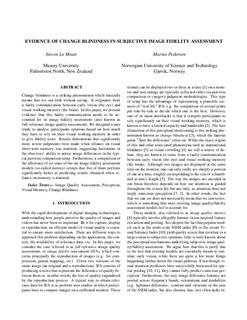| dc.contributor.author | Le Moan, Steven | |
| dc.contributor.author | Pedersen, Marius | |
| dc.date.accessioned | 2018-04-04T07:34:37Z | |
| dc.date.available | 2018-04-04T07:34:37Z | |
| dc.date.created | 2018-03-01T21:01:01Z | |
| dc.date.issued | 2017 | |
| dc.identifier.citation | Proceedings of IEEE international conference on image processing. 2017, 3155-3159. | nb_NO |
| dc.identifier.issn | 1522-4880 | |
| dc.identifier.uri | http://hdl.handle.net/11250/2492481 | |
| dc.description.abstract | Change blindness is a striking phenomenon which basically means that we can look without seeing. It originates from a faulty communication between early vision (the eye) and visual working memory (the brain). In this paper, we present evidence that this faulty communication needs to be accounted for in image fidelity assessment (also known as full-reference image quality assessment). We designed a user study to analyse participants opinions based on how much they have to rely on their visual working memory in order to give fidelity score. Results demonstrate that significantly more severe judgments were made when reliance on visual short-term memory was minimal, suggesting limitations in the observers' ability to notice image differences in the typical pairwise comparison setup. Furthermore, a comparison of the efficiency of six state-of-the-art image fidelity assessment models (so-called metrics) reveals that five of them perform significantly better at predicting results obtained when reliance on memory is minimal. | nb_NO |
| dc.language.iso | eng | nb_NO |
| dc.publisher | Institute of Electrical and Electronics Engineers (IEEE) | nb_NO |
| dc.title | Evidence of change blindness in subjective image fidelity assessment | nb_NO |
| dc.type | Journal article | nb_NO |
| dc.type | Peer reviewed | nb_NO |
| dc.description.version | acceptedVersion | nb_NO |
| dc.source.pagenumber | 3155-3159 | nb_NO |
| dc.source.journal | Proceedings of IEEE international conference on image processing | nb_NO |
| dc.identifier.doi | 10.1109/ICIP.2017.8296864 | |
| dc.identifier.cristin | 1569928 | |
| dc.description.localcode | © 2018 IEEE. Personal use of this material is permitted. Permission from IEEE must be obtained for all other uses, in any current or future media, including reprinting/republishing this material for advertising or promotional purposes, creating new collective works, for resale or redistribution to servers or lists, or reuse of any copyrighted component of this work in other works. | nb_NO |
| cristin.unitcode | 194,63,10,0 | |
| cristin.unitname | Institutt for datateknologi og informatikk | |
| cristin.ispublished | true | |
| cristin.fulltext | postprint | |
| cristin.qualitycode | 1 | |
